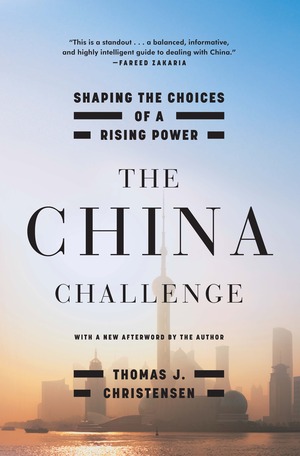
Thomas J. Christensen is a talented political scientist who once taught at the Massachusetts Institute of Technology (MIT). “In Shaping The Choices of a Rising China: The China Challenge,” Thomas J. Christen tries to explain the perils and problems posed by China to the United States, including its allies in the region. This is all done based on his perspective in the State Department, where he briefly served the deputy assistant secretary of state on China, Japan and Mongolia.
Like Robert Zoellick, the former deputy secretary of state under the Bush Administration, Thomas J. Christensen argued that China should be given the opportunity to be a “responsible stakeholder.” In fact, prior to China ever becoming a challenge to the United States, it was evident to the administration of President Bill Clinton that China could block various American initiatives at the UN Security Council. In other words, with or without the rise of China , China is a potential hindrance to the grand strategy of the United States.
Why then did the United States under President Richard Nixon and National Security Adviser Henry Kissinger, allow the People’s Republic of China to replace Taiwan as a permanent member of the UN Security Council ? The answer lay in the belief by all the actors in US, including Lee Kuan Yew in Singapore, who was a surrogate and advisor to Henry Kissinger, that the “rise of China” is inevitable. The sooner one engages China, the better.
Thomas J. Christen spoke of the “Strategic Economic Dialogue” (SED) attended and pioneered by Treasury Secretary Hank Paulson in 2006. But the belated nature of the SED, coming as it was, after nearly twenty-five years of diplomatic normalization with China in 1979, speaks volumes of the systemic neglect of Beijing. While China and the US may have cooperated on all fronts to contain Soviet Union, the two of them did not look ahead to what they could jointly do viz the world writ large.
The overall effect is a Sino-US relationship that tends to suffer from occasional free fall, reset, and rebalancing, all of which are confusing to the Chinese decision makers, as China is not considered as a major pivot, merely a needle, that is allowed to tweak north whenever America holds the proverbial compass. Thomas J Christensen understands the importance of China. But he does not know how to pacify the Chinese or, if circumstances permit, gloat about the achievements of China. China, one should know, is a civilization pretending to be a state, or, alternatively, a state that tries to carry the mantle of a civilization. Its decision makers are vulnerable to flattery due to the vast burdens with which they carry. The United States’ Foreign Service, of which Thomas J Christensen was a key member in 2006-2007, did not know how to engage in this game of sheer indulgence; failing which they cannot claim to have the menu of choices to “shape the choices” of China. Therein lies the irony of this book; despite its amazing strength as an insider account.
